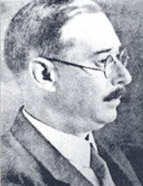

Target of legal proceedings and threatened with arrest, a s the co- editor (with Azevedo Gomes and Hernâni Cidade) of the newspaper Diário Liberal [Liberal Diary] , the dictatorship once again attacked JC by expelling his beloved disciple, Sílvio Lima ( V. ), in 1935. This sealed the anti-philosophical environment (the university’s way of degrading public freedom), in which others would not find free space for teaching, writing, meditation and life, as the cases of Agostinho da Silva and Eduardo Lourenço ma d e clear.
Finally, the dictatorship tightened the siege on the very site of reflection when it installed in the university administration and in the ideological and didactic rule, around 1950, the integrationist generation led by Miranda Barbosa, who not only did not challenge the authentic climate of philosophical repression but, in some cases, nurtured it. He resisted, allied to the Atlântida publishing house, launching the Revista Filosófica [Philosophical Magazine] (publishing Lourenço, Vieira de Almeida, Curvelo, Lima , and many others) and the excellent Biblioteca Filosófica [Philosophical Library] collection (ensured after his death by S. Lima) with the support of enlightened situationist academic ians who, in spite of the dictator, did not dispute the virtue of philosophical discussion (Moncada, Mário de Figueiredo, Maximino Correia, Afonso Queiró) and tried to repair the abolished University Press, entrusting it with the direction of the Acta Universitatis Conimbrigensis , where their editorial power was nevertheless small.
He resists, continuing his intense activity at the Academia de Ciências de Lisboa, starting at the age of 30 as Chair of the History of Science. Towards the end of his life, he would find an opening to the air of freedom in Brazil, strengthening his ties with the philosophical intelligentsia. His efforts, summarised by him in a letter, were aimed at helping ‘ the great sleeper to awaken ’: philosophy was the apex of a vast demopedic plan that had not been lost since the University of Coimbra (II-1925), with Aurélio Quintanilha, Tomás da Fonseca , and others: he was trying to fight fanaticism and the spirit of intolerance . And he supported Seara Nova ’ s ideological progress, rather than its political agenda, by translating M. G. Morente ( Ensaios sobre o progresso ; A Crença no progresso [Essays on progress; Belief in progress ] , publishing an original text ( Oróbio de Castro ) , and taking part in public sessions. During their long expatriation, he became close to António Sérgio and Raul Proença, mainly through letters.
This work is financed by national funds through FCT - Foundation for Science and Technology, I.P, in the scope of the projects UIDB/04311/2020 and UIDP/04311/2020.
